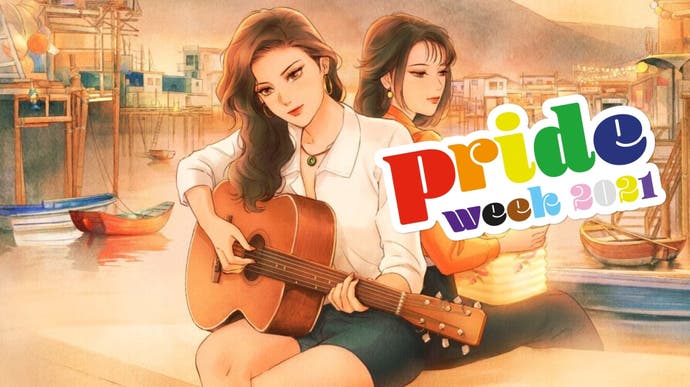A Summer's End - Hong Kong 1986 is a tale of lesbian romance and coming out
Exploring the acclaimed LGBT+ visual novel.
Hello! All this week Eurogamer is celebrating Pride with a series of stories examining the confluence of LGBT+ communities and play in its many different forms, from video games and tabletop games through to live-action role-play. Here, Lottie takes a personal delve into the visual novel A Summer's End - Hong Kong 1986. Please note this article contains significant plot spoilers.
The last thing Michelle expected when visiting a shoe cobbler in Mong Kok was to share dinner with his daughter, Sam. Yet, she finds Sam interesting and, even though she doesn't understand why at first, feels an undeniable connection to her. Their romance blossoms in A Summer's End - Hong Kong 1986 - a visual novel created by the Vancouver-based independent game studio Oracle and Bone, a game which has drawn considerable acclaim for its tender portrayal of a LGBT+ romance since its launch last year.
Its creators, Charissa So and Tida Kietsungden, say they knew they wanted to make a game with a focus on an Asian LGBT+ storyline from the onset. "We felt there was a need and opportunity to tell such stories through the medium of video games," they explain. “As LGBT+ identifying Asians ourselves, we understand the importance of representation and know that positive and authentic portrayals of ourselves are necessary in humanizing our experiences and also reducing the stigma that surrounds LGBT+ sexuality."
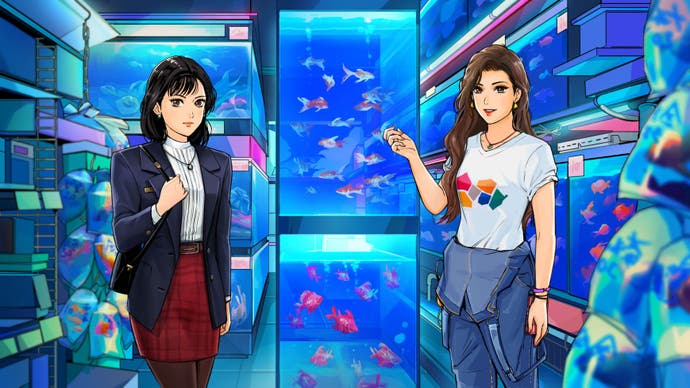
Although the relationship between Michelle and Sam lies at the heart of A Summer's End, it draws on many different elements to tell its tale, including new wave Hong Kong and Taiwanese cinema of the 1980s and 90s. As So and Kietsungden point out, these are films that explore intergenerational differences, cultural shifts, and political conflicts - topics as relevant now as they were 30 to 40 years ago and which the developers wanted to explore "in relation to current times through A Summer's End."
"[We were] surprised by the frankness in gender and sexual expression in some of these films'', So and Kietsungden explain, particularly given that Hong Kong is "quite socially conservative and topics regarding LGBT+ issues remain a bit of a taboo for the general public."
By choosing the 80s, 1986 specifically, as the initial setting for A Summer's End, Kietsungden and So were also able to contrast the uncertainty of the city's political sovereignty with the excitement of 1980s entertainment.
"[We] wanted to set our story some time after the signing of the Sino-British Joint Declaration (December 1984),” they explain, “and explore how the characters in the game would react to the rapidly changing society around them. It's important to note that the Sino-British Joint Declaration was one of the major political events that catalysed future waves of mass emigration and establishment of a new generation of diaspora communities across the world."
Development of A Summer's End began in the autumn of 2018, meaning So and Kietsungden were able to take the events of 2019 - when mass protests against an extradition bill which many of Hong Kong's citizens believed would further diminish the city's autonomy - into consideration as well. “[This] forced us to further examine our responsibility as creators and the messaging we wished to express through our game,” they say. “We had in mind from the beginning to have our character's journey in A Summer's End serve as a story about a coming out experience, but in light of such politically sensitive events, we wanted to further emphasize the story as an allegory of self-determination in face of societal change and pressures."
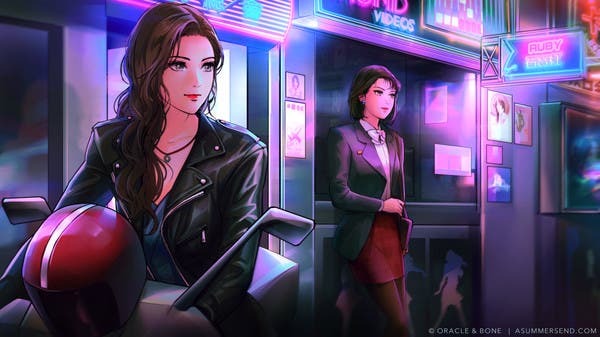
A Summer's End primarily explores these themes through Michelle, who is the portrait of the blazar clad, goal-oriented, 1980s business woman. Yet, despite her ambition, Michelle has spent most of her life conforming to both the parental and societal expectations. These characteristics are portrayed in how, regardless of her strong work ethic and readiness to stand up for herself, Michelle often worries about whether she's disappointing her mother or if she's wasting the opportunities her parents worked so hard to give her. Though, even when in doubt, Michelle remains an active protagonist in her own story - tackling both the weight of these expectations and her learned prejudices.
“We had in mind from the beginning to have our character's journey in A Summer's End serve as a story about a coming out experience, but in light of such politically sensitive events, we wanted to further emphasize the story as an allegory of self-determination in face of societal change and pressures."
Michelle's journey of self discovery begins when she meets Sam and has an instant connection with her. Although she doesn't understand these new emotions, she feels drawn to Sam, seeking out her shop, and opens up to her as they grow closer. You become more immersed in Michelle's mind as the game progresses; watching her attraction to Sam develop, while she battles an inner conflict over choosing her own path in life or fulfilling her expected role of wife and mother.
Many members of the LGBT+ community have experienced similar journeys to Michelle and, even when she missteps, it's easy to empathise with her, because you understand what drove her to make that decision. By the time you reach the game's conclusion, you truly want Michelle to embrace her authentic self - both in the terms of her sexuality and working towards the life she wishes to lead.
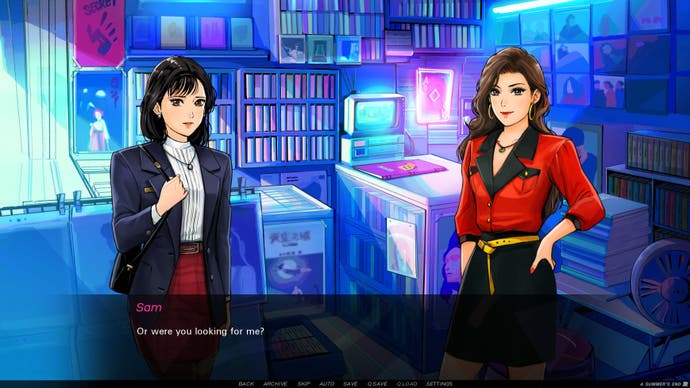
Compared to Michelle, Sam is comfortable with her sexuality and unafraid to make her desires known. Underneath this shield of confidence, however, Sam hides her vulnerability. To ensure Sam was established as her own character, So and Kietsungden decided to switch the game's perspective to her for a number of scenes, so the player can "learn more about Sam's past and why she is and acts a certain way in the story."
During this sequence, you relive events with Michelle through Sam's eyes which reinforce how their romance is founded on mutual attraction and respect. Her past is also explored and it's revealed Sam experienced similar anxieties to Michelle - worrying over whether she was a good daughter and if her deceased mother would be proud of the woman she's become.
At one point Sam recollects how, at the age of 13, she, unlike her friends and despite her attempts, 'could never really bring myself to like a boy.' When I read this line I knew I had written something similar throughout my early teenage diaries, because I started questioning my sexuality at a similar age to Sam. I remember feeling disorientated and, since I didn't feel comfortable talking about this personal discovery, I had to slowly navigate the new emotions by myself until, like Sam, I realised 'it wasn't anything to be ashamed about.'

It's a moment of triumph for Michelle when she confesses her love for Sam and agrees to start a relationship with her. Together they spend an idyllic day in the city, enjoying the pleasure of each other's company, but it can't last forever since Michelle has to return home. Here she is once again faced with the traditional expectations for women and, in an argument with her mother, reveals she's in a lesbian relationship.
Everyone's coming out experiences are different - some people are met with acceptance, others anger or, sometimes, it's cold denial. So and Kietsungden say they knew this scene would be "an emotionally difficult part of the game to create" because "as out LGBT+ creators we've gone through similar coming out experiences to conservative family members." They hope "to give readers some courage through these scenes" knowing that "coming out is an ongoing process and the fear of discrimination and prejudices is real and always present."
In A Summer's End, Michelle's mother responds with disbelief and tries to find an answer to her daughter's revelation. So and Kietsungden explain, "the dialogue from the coming out and reconciliation scene is adapted from our real life experiences", and the writing decision gives both the dialogue and Michelle's thoughts afterwards a raw emotional quality - you can feel Michelle's fear mixed with her determination to not abandon her new sense of self - which helps emphasise how her decision has changed her life forever.
Michelle decides to leave home and finds Sam outside who, after reassuring her that things will get better, invites her to move in. In this way, Sam and Michelle's journeys mirror each other; both have to leave home to be their authentic selves and doing so allows them to build healthier relationships with their family. Sam has already achieved this with her father and, in the epilogue, we see Michelle begin this process with her mother, ending the game with a sense of hope for their future.
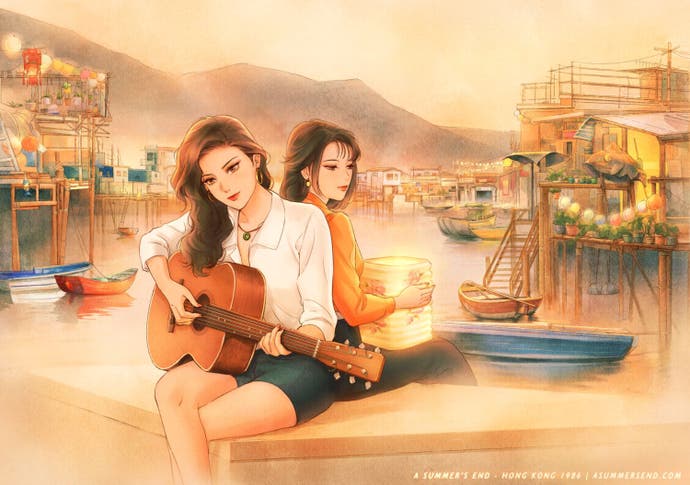
A Summer's End does, however, have a second ending where Michelle never reconciles with Sam, choosing, instead, to lead a more traditional life. So and Kietsungden say they felt it was important to depict an alternative "as it is a probable ending for Michelle and others like her when faced with such a decision" - and even though Michelle hasn't become her most authentic self, they don't consider it a bad ending. This intention is depicted in how Michelle has instead found fulfilment in raising her daughter and hopes to give her a life free of the expectations she experienced. Aware of how many members of the LGBT+ community - both past and present - have had to compromise their identities due to discrimination, the developers say they wanted this ending "to show that such a decision isn't wrong or bad, but a very complex one."
A Summer's End tells a wonderful story about a lesbian relationship, which gives representation and insight into the Asian LGBT+ community. Woven through Sam and Michelle's romance are the challenges of coming out and society's expectations for women, but also the joy of love and hope. In the ending where they become a couple, you leave Sam and Michelle sitting in the same restaurant they visited during that first evening. Michelle leans against Sam's shoulder as she holds her hand and you're left hoping that, no matter what hurdles they encounter, their love will give them the strength they need.
A Summer's End - Hong Kong 1986 is available for PC, Mac, and Linux via itch.io and Steam.
